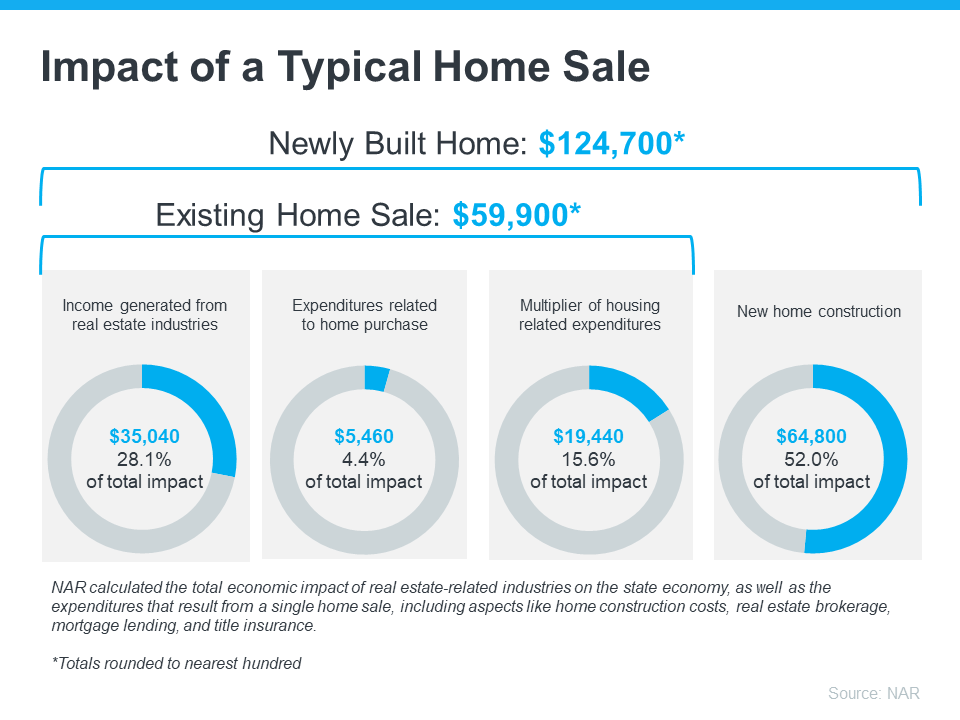
How Buying or Selling a Home Benefits Your Community
If you’re thinking of buying or selling a house, it’s important to know it doesn’t just impact you—it helps out the local economy and your community, too.
Every year, the National Association of Realtors (NAR) puts out a report that breaks down the financial impact that comes from people buying and selling homes (see visual below):
When a house is sold, it really boosts the local economy. That’s because of all the people needed to build, fix up, and sell homes. Robert Dietz, Chief Economist at the National Association of Home Builders (NAHB), explains how the housing industry adds jobs to a community:
“. . . housing is a significant job creator. In fact, for every single-family home built, enough economic activity is generated to sustain three full-time jobs for a year . . .”
It makes sense that housing creates a lot of jobs because so many different kinds of work are involved in the industry.
Think about all the people involved with selling a house—city officials, contractors, lawyers, real estate agents, specialists, etc. Everyone has a job to do to make your deal go through. So, each transaction is a big help to those who work and live in your community.
Put simply, when you buy or sell a home, you’re helping out your neighbors. So, when you decide to move, you’re not just meeting your own needs—you’re also doing something good for your community. Just knowing your move helps so many people around you can give you a sense of empowerment as you make your decision this year.
Every time a home is sold, it really helps out the local economy. If you’re ready to move, let’s get in touch. It won’t just change your life—it’ll also do a lot of good for the whole community.
Community Impact:
The impact of buying or selling a home extends beyond the confines of individual properties, leaving an indelible mark on the community at large. Here’s a closer look at how these transactions contribute to the greater good:
- Neighborhood Revitalization: The sale of homes can breathe new life into neglected or underdeveloped neighborhoods, catalyzing revitalization efforts and spurring economic growth. As properties change hands and undergo renovations, blighted areas are transformed into vibrant hubs of activity, attracting new residents and businesses alike.
- Educational Opportunities: Homeownership is closely linked to educational outcomes, with studies showing that children in stable, owner-occupied households tend to perform better academically. By buying a home in a community with quality schools and educational resources, families can provide their children with access to enriching learning environments, setting them up for success in the future.
- Health and Well-Being: Strong communities are built on foundations of health and well-being, and homeownership plays a significant role in promoting both. Research suggests that homeowners tend to lead healthier lifestyles and experience lower levels of stress compared to renters. By buying or selling a home in a community that prioritizes wellness, individuals can enjoy access to parks, recreation facilities, and healthcare services that enhance their quality of life.
Sustainable Development:
In an era defined by environmental consciousness and sustainability, the real estate industry has a vital role to play in promoting eco-friendly practices and development. From energy-efficient homes to sustainable urban planning, buying and selling homes can be a force for positive change in the following ways:
- Green Building Initiatives: With growing concerns about climate change and resource depletion, there’s increasing demand for homes that prioritize energy efficiency and environmental sustainability. By investing in green building initiatives, such as solar panels, energy-efficient appliances, and eco-friendly materials, homeowners can reduce their carbon footprint and contribute to a more sustainable future.
- Transit-Oriented Development: As cities grapple with traffic congestion and air pollution, transit-oriented development (TOD) has emerged as a promising solution. By selling homes in areas with access to public transportation and walkable amenities, developers can reduce reliance on cars and promote alternative modes of transportation, leading to cleaner air and reduced greenhouse gas emissions.
- Community Gardens and Green Spaces: Urban greening initiatives, such as community gardens and green spaces, play a crucial role in enhancing the livability and sustainability of neighborhoods. By buying or selling a home near these amenities, residents can enjoy access to fresh produce, recreational opportunities, and natural habitats that support biodiversity and ecological resilience.
Conclusion:
In the intricate tapestry of community life, the decisions we make about buying and selling homes have profound implications for the well-being and vitality of our neighborhoods. From fostering stability and economic growth to promoting sustainability and social cohesion, these transactions shape the fabric of our communities in tangible and intangible ways.
With the guidance of Real Estate Agents and the support of Local mortgage lenders, individuals can navigate the complexities of homeownership with confidence, knowing that they’re not just making a transaction; they’re investing in the future of their community. By prioritizing affordability, sustainability, and community engagement, we can create vibrant, inclusive neighborhoods where everyone has the opportunity to thrive.
As we look ahead to the future of real estate, let us remember that the true measure of success lies not just in property values or market trends but in the strength and resilience of our communities. By working together to create homes that are not just buildings but vibrant centers of community life, we can build a better, more sustainable future for generations to come.
Read from source: “Click Me”
Questions, Comments or For more information you can call
Christian Penner Branch Manager at 561-316-6800 or email us at TheMortgageTeam@ChristianPenner.com
Approval Hotline: 561-316-6800
Helping You Achieve the American Dream of Home Ownership
Or You can click “Call Me” below to call Christian Penner directly using Google Voice



















